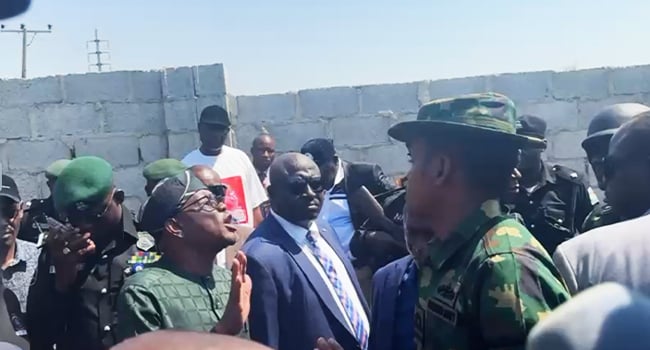A major controversy erupted in Nigeria’s Federal Capital Territory (FCT) as soldiers reportedly clashed with the Minister of the FCT, Nyesom Wike, during an enforcement operation over a disputed piece of land in Abuja. The confrontation, which was captured in viral videos, sparked widespread outrage and debates about military professionalism, civilian authority, and the boundaries between governance and security operations. Hours after the altercation, the Defence Headquarters (DHQ) released a carefully worded but striking statement, emphasizing discipline, honour, and professionalism within the Nigerian Armed Forces — a response many have interpreted as a subtle reaction to the minister’s clash with the soldiers.
Background of the Incident
According to multiple eyewitness accounts, the confrontation occurred when Wike, accompanied by senior officials of the Federal Capital Development Authority (FCDA), stormed a disputed land site in Abuja. The land was allegedly under contention between the FCT Administration and individuals purportedly linked to the military.
Wike, who is known for his bold and assertive leadership style, reportedly confronted a group of soldiers stationed at the site. He accused them of obstructing lawful government work and questioned their presence, demanding to know under whose authority they were deployed.
The soldiers, on their part, reportedly insisted they were guarding a property belonging to the Nigerian Navy and had official instructions to secure it. The verbal exchange quickly intensified, with Wike expressing anger over what he described as an “abuse of power” and “illegal occupation” of land meant for public use.
Defence Headquarters’ Response
In the wake of the public outrage and speculation that followed the confrontation, the Defence Headquarters issued a short but powerful message through its verified communication channels. The statement read:
“It is an honour to serve in the Nigerian Armed Forces. The Nigerian military remains committed to professionalism, discipline, and respect for constituted authority.”
While the DHQ did not directly mention Wike or the specific incident, the timing of the statement left little doubt that it was in reference to the viral clash. The message served as both a reassurance to Nigerians and a reminder to service members about the values and expectations of the military institution.
Public Reactions and Political Undertones
The clash immediately ignited a storm of reactions across Nigeria’s political and social circles. Supporters of Wike praised his courage and insistence on due process, saying the incident highlights the growing misuse of military personnel in civil matters.
On the other hand, some critics accused Wike of overstepping his bounds, arguing that the military presence might have been justified if the land truly belonged to the Navy. Others saw the incident as another reflection of Wike’s fiery temperament and confrontational leadership style, traits that have followed him since his days as Governor of Rivers State.
Social media platforms were flooded with videos and comments dissecting the confrontation, with many Nigerians demanding an official investigation into the ownership of the disputed land and the legality of military deployment to protect it.
Land Disputes and the Role of Security Forces in Abuja
Abuja, Nigeria’s capital city, has long been plagued by land disputes involving government agencies, private developers, and powerful interests. The FCT Administration has repeatedly lamented the encroachment on government lands, illegal constructions, and the use of security operatives to intimidate or protect private developers.
The involvement of military personnel in civilian property issues has raised constitutional questions. Under Nigerian law, the Armed Forces are primarily responsible for defending the nation against external threats, while land and property enforcement fall under civil authorities like the FCDA, Development Control Department, and the Nigeria Police.
Analysts argue that such clashes highlight a deeper problem — the blurring of lines between civil administration and military authority, especially in matters unrelated to national security.
Wike’s Leadership Style Under Scrutiny
Since assuming office as FCT Minister, Nyesom Wike has launched a series of aggressive reforms aimed at restoring the Abuja Master Plan. His demolition exercises, land recovery campaigns, and enforcement drives have earned him both praise and criticism.
Supporters hail him as a no-nonsense reformer determined to bring sanity to the capital city. However, detractors accuse him of using excessive force and being confrontational in his approach. The recent face-off with soldiers has further cemented his reputation as a fearless, sometimes controversial, public official who is not afraid to challenge entrenched interests.
The Military’s Delicate Position
The Defence Headquarters’ response was widely seen as an attempt to manage public perception and reaffirm discipline within the ranks. Military analysts note that the statement was strategically worded to defend the integrity of the institution without escalating tensions with the political class.
The Nigerian military, in recent years, has made efforts to distance itself from political interference and restore its image as a neutral and professional force. Incidents like the Wike confrontation threaten to undermine that progress if not handled carefully.
Possible Government Action and Next Steps
Insiders within the FCT Administration suggest that a formal petition may be filed to the Presidency and the Ministry of Defence to investigate the incident. The goal, according to reports, is to establish whether the soldiers involved acted under lawful orders or were being used to protect private interests.
The Defence Headquarters, on its part, is expected to conduct an internal review to ensure that its personnel adhere strictly to operational codes of conduct and avoid involvement in civilian disputes.
Observers believe that the outcome of this case will serve as a test of institutional accountability — both for the FCT Administration and the military.
Broader Implications for Civil-Military Relations
Nigeria’s democratic stability depends heavily on the balance between civilian authority and military obedience. Incidents like this highlight the ongoing tension between both sides in a developing democracy.
Experts warn that the military’s involvement in non-security matters could erode public trust, while excessive confrontation from civil authorities could damage mutual respect and cooperation. A healthy relationship between both institutions is vital for maintaining order, upholding the rule of law, and ensuring effective governance.



